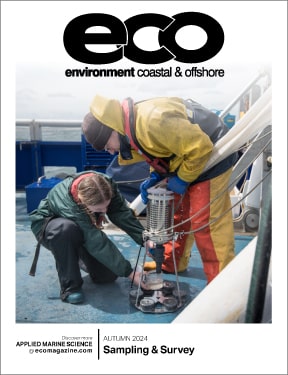WHOI’s Aran Mooney, associate scientist in the Biology Department, and Weifeng “Gordon” Zhang, associate scientist in the Department of Applied Ocean Physics and Engineering, will lead the project, along with partners from Oceans Forward Dominica and the Central Caribbean Marine Institute.
Coral reef ecosystems are critical for marine biodiversity and coastal protection, but their degradation poses a significant challenge for restoration efforts. Recent studies have shown that coral larvae are capable of responding to environmental cues, such as sound, to find suitable habitats for settlement. The funds received from the G20 Coral Research and Development Accelerator Platform (CORDAP) will be used to explore and optimize the use of acoustic enrichment to enhance coral larvae settlement across various coral species in the Dominican Republic, Cayman Islands, and the US Virgin Islands (USVI). This work is a continuation of WHOI research that showed coral larvae are capable of responding to sound to find suitable habitats for settlement.
“The Reef Acoustic Playback System (RAPS) was developed to play healthy reef soundscapes, providing a method to enrich the acoustic environment of degraded reefs,” explained project lead Mooney. “By using sound as a cue to attract coral larvae to these areas, RAPS aims to create a positive feedback loop that helps restore reef ecosystems.”
One key to the survival and recovery of coral populations is the successful settlement of coral larvae. However, many reefs face low settlement rates due to declining coral populations and the absence of natural cues that encourage larvae to settle. Traditional restoration methods, like outplanting, are time- and resource-intensive, making them difficult to scale effectively.
The CORDAP grant will help develop effective methods for applying this technique in real-world settings. The system will incorporate environmental data such as temperature, salinity, and currents from calibrated high-resolution hydrodynamic models to predict the locations that coral larvae may be transported to, allowing for the RAPS system to be deployed in the most efficient way to increase restoration success. With an improved understanding of the method, local stakeholders, divers, and eco-tourism operators will also be trained in the application of acoustic enrichment techniques.
“Coral reefs provide habitat for 25% of marine life and support billions in tourism and fishing. They also serve as a natural barrier that protects coastlines from flooding and erosion during storm surges,” said WHOI’s Zhang. “By engaging community partners, we’ll be giving these vulnerable ecosystems a greater chance of survival.”
This project was one of eight selected from 120 proposals to receive funding from CORDAP’s Coral Accelerator Program (CAP). These projects, with a total investment of $10 million, span 18 countries and are set to make significant contributions to coral conservation and restoration.
WHOI’s Reef Solutions team is scheduled to return to the USVI in November 2024 to continue this work.

